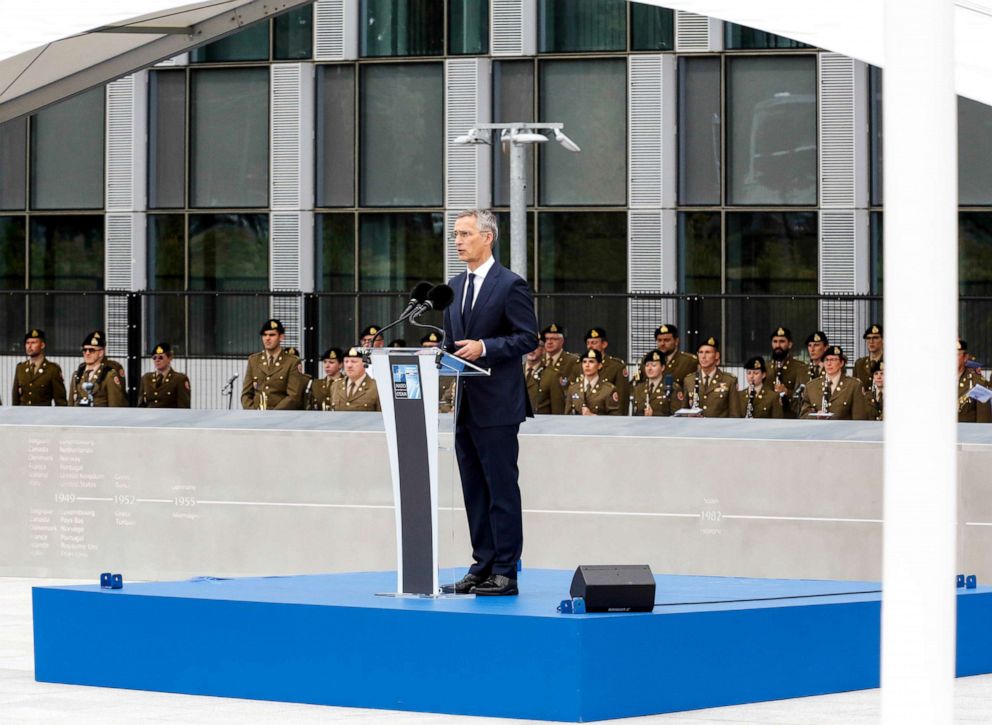NATO Secretary General addresses joint session of Congress as alliance celebrates 70th anniversary
NATO was established in 1949 to counter Soviet aggression in Europe.
NATO Secretary General Jens Stoltenberg delivered an address to a joint session of the U.S. Congress on Wednesday, kicking off a two-day meeting of NATO foreign ministers and the celebration of the alliance’s 70th anniversary.
"The strength of a nation is not only measured by the size of its economy, or the number of its soldiers, but also by the number of its friends,” Stoltenberg told Congress. “And through NATO, the United States has more friends and allies than any other power."
The address followed Stoltenberg’s meeting with President Donald Trump at the White House, in which the president praised his leadership of the alliance. Stoltenberg – who has led NATO since 2014 – has routinely credited Trump for pushing NATO allies to spend more on defense, something he did again before Congress on Wednesday.
"NATO allies must spend more on defense. This has been the clear message from President Trump, and this message is having a real impact,” Stoltenberg said. “All allies have increased their defense spending. Before they were cutting billions, and now they're adding billions.”

"The media never gives me credit, but he gives me credit," Trump told reporters on Tuesday.
At times, Trump’s “America First” foreign policy has publicly undercut NATO -- including a report from the New York Times in January (should link) that the president had spoken to aides about withdrawing from the alliance. But days after the story was published, Trump seemed to assure U.S. allies, saying “We’re going to be with NATO 100 percent.”
Jens Stoltenberg, NATO Secretary General, just stated that because of me NATO has been able to raise far more money than ever before from its members after many years of decline. It’s called burden sharing. Also, more united. Dems & Fake News like to portray the opposite!
— Donald J. Trump (@realDonaldTrump) January 27, 2019
So what exactly is NATO, and why is the organization so significant? ABC News breaks down the alliance.
What is NATO?
NATO stands for the North Atlantic Treaty Organization, a security alliance established in 1949 during the early days of the Cold War to counter Soviet aggression in Europe.Now numbering 29 countries in Europe and North America, the alliance’s goal is to “safeguard the freedom and security of its members through political and military means,” according to its website.
North Macedonia is on track to become the organization’s 30th member.
The organization promotes “democratic values” and encourages member nations to work together on issues of defense and security to prevent long-term conflict.
NATO adheres to a policy of collective defense, meaning an attack on one member is considered "an attack against all." The policy is outlined in Article 5 and has only been invoked once, after the Twin Towers in New York City were attacked Sept. 11, 2001, and NATO members sent troops to Afghanistan where they still train and advise Afghan security forces today. There have been 1,044 non-U.S. NATO service members killed fighting in Afghanistan.
How does NATO work?
Headquartered in Brussels, Belgium, each member nation is represented by an ambassador that sits on the North Atlantic Council (NAC), the alliance’s political decision-making body. The NAC meets at least once a week and is chaired by Stoltenberg, a former prime minister of Norway.
When political decisions require military involvement, NATO’s Military Committee helps plan the military elements needed for an operation. While NATO has few permanent military forces, member nations can voluntarily contribute forces when the need arises.
Where is NATO operating right now?
Currently, NATO’s website lists six active operations and missions: Afghanistan, Kosovo, securing the Mediterranean Sea, training mission in Iraq, supporting the African Union, and policing airspace.
ABC's Elizabeth McLaughlin contributed to this report from the Pentagon.




